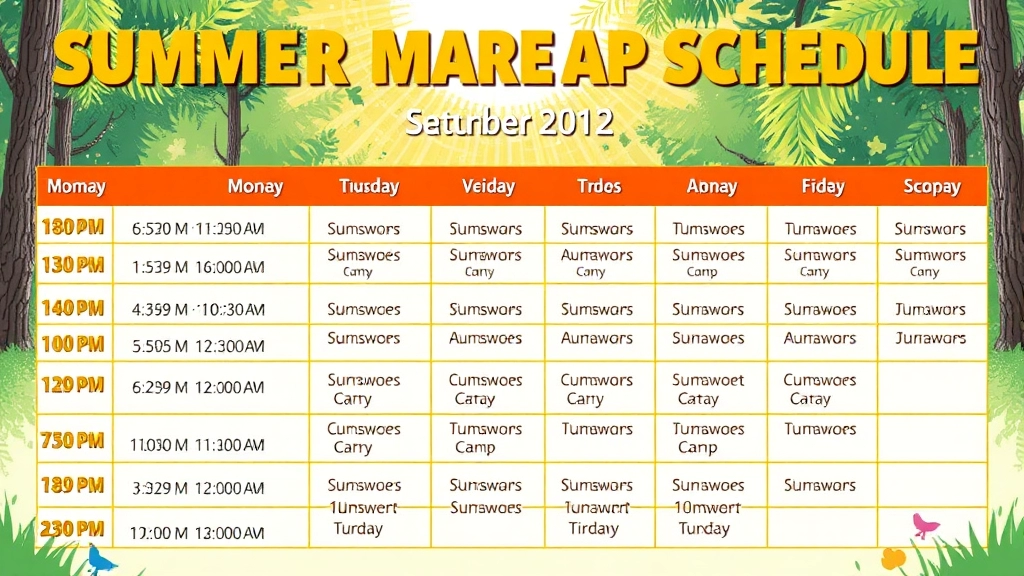Welcome to Summer Camp!
Welcome to a world where summer camp schedules are more than just a list of activities—they’re a roadmap to an unforgettable experience! In this article, we’ll explore how our meticulously crafted schedule ensures that every child has a summer filled with fun, learning, and growth. From daily activity breakdowns to age-specific schedules, we’ve thought of everything to keep your child engaged and safe.
Our Approach
Our summer camp schedule is designed with both structure and flexibility in mind. With weekly themes, special events, and optional activities, we cater to diverse interests while maintaining a focus on safety and supervision. Plus, our seamless parent communication ensures you’re always in the loop.
Join Us!
Ready to dive in? Let’s explore how we make summer camp a memorable adventure for every child!
Daily Activity Breakdown
Alright, let’s dive into the nitty-gritty of what your kiddo will be up to every single day. I get itâyou’re probably wondering, “What exactly does my child do all day?” or “How structured is this schedule?” Well, let’s break it down so you know exactly what to expect.
Morning Routine
We kick off the day with a morning routine designed to get everyone energized and ready to tackle the day. Think of it as a warm-up session for the brain and body.
- Arrival and Check-in: Kids arrive and settle in. We make sure everyone feels welcome and ready to start the day.
- Morning Circle Time: A quick roundup where we discuss the day’s agenda, share any news, and do a few ice-breaker activities.
Learning and Exploration
This is where the real fun begins. Our learning and exploration sessions are designed to be both educational and engaging.
- Themed Activities: Each week has a theme (more on that later), and daily activities revolve around this theme. Whether it’s science experiments or art projects, there’s always something cool happening.
- Outdoor Play: We believe in the power of fresh air. Kids get some outdoor time to run around, play games, and just be kids.
- Story Time: A classic, right? We gather everyone for a story that ties into the weekly theme. It’s a great way to wind down before lunch.
Lunch and Downtime
Meal and snack times are crucial. We provide healthy, balanced meals to keep those little engines running.
- Lunch: A nutritious meal that caters to various dietary needs. We make sure everyone gets what they need.
- Quiet Time: After lunch, it’s time to chill. Whether it’s a nap for the younger ones or quiet activities for the older kids, everyone gets a break.
Afternoon Activities
The afternoon is all about hands-on activities and skill-building.
- Creative Projects: From crafts to building projects, this is the time to get creative.
- Group Games: Team-building exercises and group games help kids develop social skills and teamwork.
- Specialist Sessions: Depending on the day, we might have a specialist come in for a music lesson, a science demo, or even a mini sports clinic.
Wrap-Up and Reflection
As the day winds down, we gather everyone for a wrap-up session.
- Daily Recap: We talk about what we did, what we learned, and what was fun. It’s a great way to reinforce the day’s lessons.
- Pick-up Time: Parents come to collect their happy, tired kids.
Real Stories, Real Fun
Let me share a quick story. Last week, during our “Space Exploration” theme, we had a mini rocket launch in the playground. The kids were over the moon (pun intended). They built their own little rockets and watched them soar. It was a blastâliterally and figuratively.
For more ideas on how to make your child’s summer unforgettable, check out our creative summer camp themes. And if you’re curious about the benefits of such activities, don’t miss our guide on the purpose of having fun at summer camp.
Weekly Themes and Special Events

Ever wonder how to keep kids engaged week after week?
We’ve got you covered with our Weekly Themes and Special Events.
Why Themes Matter
Themes give kids something to look forward to.
They break the monotony.
They make each week unique.
Imagine this:
- One week, it’s all about space exploration.
- The next, we’re diving into ocean adventures.
What to Expect
Special Events are the cherry on top.
Think:
- Talent shows where every kid gets to shine.
- Sports days to burn off that endless energy.
- Science fairs to spark curiosity.
Real Examples
Last summer, we had a Pirate Week.
Kids built their own mini-ships.
We even had a treasure hunt.
It was a blast!
How We Plan
We plan these themes and events well in advance.
This ensures everything runs smoothly.
And trust me, kids notice the effort.
Benefits for Kids
- Keeps them excited.
- Encourages learning in fun ways.
- Builds anticipation and engagement.
Parent Perks
You get a heads-up on the themes.
So, you can prepare your kids.
And maybe even join in on the fun.
How to Stay Updated
We’ll keep you in the loop through:
- Weekly newsletters
- Parent-teacher meetings
- Our app notifications
Age Group-Specific Schedules
Ever wonder how to keep kids of different ages engaged and happy throughout the day? It’s a common worry for many parents. We get it. Each age group has its own unique needs and interests. That’s why we’ve crafted age-specific schedules to ensure every child has an enriching and enjoyable experience.
Why Age-Specific Schedules Matter
Let’s face it: a 5-year-old and a 12-year-old have very different ideas of fun. Kids develop at different rates, and their activities should reflect that. Our age-specific schedules are designed to:
- Maximize Engagement: Tailored activities keep kids interested and involved.
- Promote Learning: Age-appropriate educational activities help kids grow.
- Ensure Safety: Different age groups have different supervision needs.
Age Groups and Their Schedules
We divide our kids into three main age groups:
- Toddlers (2-4 years)
- Kids (5-8 years)
- Tweens (9-12 years)
Each group has a distinct schedule packed with activities that suit their developmental stage.
Toddlers (2-4 years)
For our youngest attendees, we focus on simple, engaging activities that help them develop basic skills. Here’s what a typical day looks like:
- Morning Circle Time: Songs, stories, and simple games.
- Creative Play: Building blocks, puzzles, and art projects.
- Snack Time: Healthy snacks to keep energy levels up.
- Nap Time: A much-needed rest period.
- Outdoor Play: Safe, supervised play in our toddler-friendly playground.
Kids (5-8 years)
This age group is all about exploration and learning through play. Their schedule includes:
- Morning Activities: Science experiments, arts and crafts, and storytelling.
- Outdoor Play: Games like tag, soccer, and relay races.
- Lunch Break: Nutritious meals to fuel their day.
- Educational Games: Interactive learning through fun activities.
- Free Play: Time to choose their own adventure.
Tweens (9-12 years)
For our oldest group, we provide more complex activities that challenge their minds and bodies:
- Team Projects: Group activities that build teamwork and problem-solving skills.
- Sports and Fitness: Basketball, swimming, and other physical activities.
- Lunch Break: Balanced meals to keep them going.
- Creative Workshops: Coding, music, and advanced art projects.
- Free Time: A chance to relax and socialise.
Flexibility and Customisation
We understand that every child is unique. That’s why we offer some flexibility within these schedules. If your child has specific interests or needs, let us know. We’re here to make their experience as enjoyable and beneficial as possible.
Real-Life Example
Take Sarah, a mum of two kids aged 4 and 9. She was worried about finding a programme that would suit both her children. With our age-specific schedules, her toddler enjoys simple, engaging activities while her older child dives into more challenging projects. Both kids come home happy and fulfilled, making Sarah’s life a lot easier.
By tailoring our schedules to different age groups, we ensure that each child gets the most out of their day. It’s all about creating a balanced, enriching experience that caters to their unique needs. So, whether you’ve got a curious toddler or an energetic tween, we’ve got a schedule that works for them.
Got questions or concerns about our age-specific schedules? Feel free to reach out. We’re here to help!
For more tips on creating a fun and safe environment for your kids, check out our guide on fun activities and safety. If you’re looking for more ways to keep your children engaged, explore our top games for summer camp fun.
Drop-off and Pick-up Times

Ever find yourself stressing over drop-off and pick-up times?
Yeah, we’ve all been there.
Here’s how we make it easy for you.
Drop-off Times
We know mornings can be chaotic.
That’s why we offer a flexible drop-off window.
- Early Birds: Drop-off starts at 7:30 AM.
- Regulars: Up until 9:00 AM, you’re good to go.
So, whether you’re an early riser or need those extra few minutes, we’ve got you covered.
Pick-up Times
Afternoons can be just as hectic, right?
No worries, we’ve sorted that out too.
- Early Pick-up: From 3:30 PM.
- Late Pick-up: Until 6:00 PM.
This way, you can manage your schedule without breaking a sweat.
Late Fees
Now, we get it—life happens.
But if you’re late for pick-up, there’s a small fee.
- £5 for every 15 minutes past 6:00 PM.
We’re not trying to be harsh; it’s just to make sure our staff can plan their evenings too.
Why It Matters
Consistency is key for your child.
Knowing when they’ll be picked up and dropped off helps them feel secure.
Plus, it makes your life easier, right?
Real Talk
Imagine this: You’ve got a big meeting at 8:00 AM, and you’re worried about getting your kid to camp on time.
With our flexible drop-off, you can breathe easy.
Drop them off early and you’re set for the day.
Quick Tips
- Set a reminder on your phone for pick-up times.
- Share your schedule with a friend or family member who can step in if needed.
- Communicate any changes in advance.
Parent Communication
We’ll keep you updated via text or email if there are any changes to the schedule.
So, you’re never left in the dark.
Meal and Snack Times
Are you worried about how your kids’ meal and snack times fit into their busy schedules? Let’s break it down, no fluff, just the facts.
Why Meal and Snack Times Matter
Here’s the deal: kids need fuel to keep their energy up for all the activities we’ve got planned. Without the right food at the right time, they might struggle to keep up. So, let’s dive into how we structure meal and snack times to keep everyone happy and healthy.
Daily Meal Schedule
Breakfast:
- Time: 8:00 AM
- Details: We kick off the day with a balanced breakfast. Think cereals, fruits, and toast. It’s all about giving them the energy to start strong.
Morning Snack:
- Time: 10:00 AM
- Details: A quick bite to keep the energy levels up. Options include fruit slices or a granola bar.
Lunch:
- Time: 12:30 PM
- Details: A hearty meal with a mix of proteins, carbs, and veggies. We make sure it’s nutritious and something they’ll actually eat.
Afternoon Snack:
- Time: 3:00 PM
- Details: A little something to tide them over until the end of the day. Think yoghurt or a small sandwich.
Dinner (if applicable):
- Time: 5:30 PM
- Details: For those staying late, we offer an evening meal. Simple, healthy, and filling.
Special Dietary Needs
Worried about allergies or specific dietary needs? We’ve got you covered. Here’s what we do:
- Custom Meals: We adapt meals for allergies or dietary restrictions.
- Communication: We work closely with parents to ensure everyone’s needs are met.
Keeping It Fresh and Fun
We know how picky kids can be. So, we keep things interesting:
- Weekly Themes: Taco Tuesday, anyone? Or how about Pasta Friday?
- Interactive Meals: Sometimes, we let the kids build their own sandwiches or pizzas. It’s fun, and they’re more likely to eat it.
Safety and Hygiene
Safety first, always. Here’s how we ensure meal times are safe and clean:
- Supervision: Staff are always present during meals to assist and supervise.
- Hygiene: We follow strict hygiene protocols. Clean hands, clean surfaces, clean food.
Keeping You in the Loop
We know you want to know what your kids are eating. So, here’s how we keep you informed:
- Weekly Menus: Sent out every Sunday, so you know what’s on the menu.
- Daily Updates: A quick message to let you know how meal times went.
For more tips on ensuring a fun and safe experience for your kids, check out our Summer Camp Cabin Safety and Design Tips. And if you’re interested in keeping your kids engaged with creative activities, don’t miss our guide on Fun Summer Camp Crafts for Kids.
Field Trip Itineraries

Wondering what our field trips look like?
We’ve got you covered.
Field trips can be a huge worry for parents.
You think about safety, supervision, and whether your child will have a blast.
We get it.
So, let’s dive into what a typical field trip itinerary looks like.
Morning Kick-Off
We start the day with a briefing session.
Kids gather around, and we talk about the day’s adventure.
Think of it as a mini-mission briefing.
Key Points Covered:
- Destination details
- Safety rules
- Fun facts about the place
Travel Time
We board our trusty bus.
Safety first, always.
Kids are seated, seatbelts on, and we do a headcount.
Every. Single. Time.
Arrival and Exploration
Once we arrive, it’s all about exploration.
Whether it’s a museum, zoo, or park, we’ve got a plan.
Activities Include:
- Guided tours
- Interactive sessions
- Free exploration time
Lunch Break
Kids need fuel.
We have a designated lunch area.
Lunches are packed, healthy, and yummy.
Kids sit, eat, and chat about what they’ve seen.
Afternoon Fun
Post-lunch, the fun continues.
We dive into more activities.
Think scavenger hunts, educational games, and group challenges.
Wrap-Up and Head Back
As the day winds down, we gather the kids.
We do another headcount.
Then it’s back on the bus.
We chat about the day’s highlights on the way back.
Safety Measures
Safety isn’t just a word; it’s a practice.
Here’s what we do:
- Buddy System: Kids are paired up to look out for each other.
- Staff Ratio: We maintain a high staff-to-child ratio.
- Emergency Plan: We have a plan for any situation.
Real Stories
Remember our trip to the science museum?
One kid discovered his love for astronomy.
Another couldn’t stop talking about the dinosaur exhibit.
These trips aren’t just fun; they’re life-changing.
Safety and Supervision Guidelines
Safety and Supervision Guidelines: Your Kid’s Well-being is Our Top Priority
Alright, let’s get real. As a parent, you’re probably thinking, “Is my kid going to be safe?” It’s a valid concern, and trust me, we get it. Safety isn’t just a checkbox for usâit’s the whole darn list.
The Basics: What We Do to Keep Your Kids Safe
First off, let’s talk about the basics. Here’s a quick rundown of our core safety practices:
- Trained Staff: Our team isn’t just a group of random folks. They’re trained in first aid, CPR, and child supervision.
- Background Checks: Every staff member undergoes a thorough background check. No exceptions.
- Child-to-Staff Ratio: We maintain a low child-to-staff ratio to ensure every kid gets the attention they need.
- Secure Facilities: Our premises are equipped with security cameras and controlled access points.
Supervision: Eyes Everywhere
You might be wondering, “How do you keep an eye on so many kids?” Great question. Here’s how we do it:
- Constant Headcounts: We perform headcounts at regular intervals. No kid gets left behind.
- Designated Zones: Our facilities are divided into zones, each supervised by specific staff members.
- Buddy System: Kids are paired up with a buddy. It’s fun for them and an extra layer of security for us.
Emergency Protocols: We’re Prepared for Anything
Accidents happen, but we’re ready for them. Here’s our game plan:
- First Aid Kits: Easily accessible and fully stocked.
- Emergency Contacts: We have your contact details on hand and update them regularly.
- Evacuation Drills: We conduct regular drills so kids know exactly what to do in case of an emergency.
Real Talk: Stories from the Field
Let me share a quick story. Last summer, we had a little guy named Timmy. Timmy was a bit of a wanderer. One day, during a field trip, he got a bit too curious about a butterfly and wandered off. Thanks to our buddy system and quick headcount, we noticed immediately. Timmy was back with the group in under a minute, safe and sound. His mum was super relieved, and so were we.
Keeping You in the Loop
We believe in transparency. Here’s how we keep you informed:
- Daily Updates: You’ll get a summary of your child’s day, including any minor scrapes or incidents.
- Immediate Alerts: For anything urgent, you’ll be contacted right away.
- Parent Meetings: Regular meetings to discuss any concerns and get your feedback.
For more information on how we ensure a fun and safe environment, check out our Abess Summer Camp: Fun Activities and Safe Environment. If you’re interested in the safety measures for a specific camp, read our Widefield Summer Camp: Fun, Safe, and Unforgettable guide.
Optional Activities and Free Time

Ever find yourself wondering, “What will my kid do during free time at camp?”
I get it.
You want to make sure they’re not just twiddling their thumbs.
Let’s break it down.
Why Optional Activities Matter
Kids need structure, but they also need freedom.
Optional activities are the sweet spot.
They let kids explore their interests without feeling boxed in.
Here’s what we offer:
- Arts and Crafts: Perfect for the creative souls.
- Sports: From football to tennis, we’ve got it all.
- Reading Corners: For those who want a quiet escape.
- Board Games: A fun way to make new friends.
Real-Life Example
Remember Jamie, who hated sports?
He found his love for painting during one of these optional sessions.
Now, he’s the camp’s Picasso.
Free Time: The Balance
Free time isn’t just about doing nothing.
It’s a chance for kids to recharge.
But we keep it balanced.
Here’s how:
- Supervised Zones: Kids are safe but free to choose activities.
- Flexible Timings: They can switch between activities as they like.
- Peer Interaction: Encourages social skills.
What Parents Worry About
“Will my child be safe?”
“Will they feel left out?”
Rest easy.
Our supervision is top-notch.
And with so many options, no one feels left out.
A Quick Recap
- Arts and Crafts: Get creative.
- Sports: Stay active.
- Reading Corners: Find peace.
- Board Games: Have fun.
Optional activities and free time are all about balance.
It’s where structure meets freedom.
And trust me, your kids will thank you for it.
Parent Communication and Updates
How Do We Keep Parents in the Loop?
Ever wonder if you’re missing out on your kid’s day-to-day at our programme? I get it. As a parent, you want to know what’s happening and when. So, how do we make sure you’re always in the know?
Regular Updates: Your Daily Digest
We’ve got a system in place to keep you updated. Here’s how:
- Daily Emails: Each day, you’ll receive an email summarising activities, highlights, and any special notes.
- Weekly Newsletters: Every Friday, we send out a newsletter with a recap of the week and a sneak peek into the upcoming events.
- SMS Alerts: For urgent updates or changes, we shoot a quick text. No one likes surprises, right?
Parent-Teacher Meetings: Let’s Chat
We believe in open dialogue. Here’s how we make that happen:
- Monthly Meetings: We host a casual meet-up every month. Grab a coffee, chat with us, and share your thoughts.
- One-on-One Sessions: Need a private chat? Just book a session at your convenience.
Online Portal: Access Anytime
We’ve got an online portal that’s your go-to for everything:
- Activity Logs: Check out what your child has been up to.
- Photo Gallery: See the fun in action with regularly updated photos.
- Important Documents: Access forms, schedules, and guidelines easily.
Stories from the Ground
Let me share a quick story. Last summer, we had a parent worried about their child feeling left out. Thanks to our real-time updates, they saw their kid smiling in a group activity photo. Instant relief!
Why This Matters
Keeping you informed isn’t just a task; it’s about building trust and ensuring you feel connected. After all, you’re part of this journey too. For more on making the most out of your child’s camp experience, check out our guide to maximizing your basketball summer camp experience.
Additionally, if you’re looking for creative ways to stay engaged, our article on summer camp culture and traditions offers great insights.
Registration and Payment Deadlines
Are you worried about missing the registration deadline for your child’s activities?
Or maybe you’re stressed about the payment process?
Don’t worry, I’ve got you covered.
Why Registration Deadlines Matter
Let’s be real.
No one likes to miss out.
Registering on time ensures your child has a spot.
It also helps us plan better.
We need to know numbers for staffing and supplies.
So, mark those dates!
How to Register
It’s super simple.
Here’s a quick rundown:
- Online Form: Fill out the form on our website.
- In-Person: Drop by our office during business hours.
- Over the Phone: Give us a ring and we’ll sort it out.
Payment Options
We want to make it easy for you.
Here are your choices:
- Credit/Debit Card: Fast and secure.
- Bank Transfer: Just use the details provided.
- Cash: Pay at our office.
Important Dates to Remember
- Early Bird Registration: Save money by registering early.
- Standard Registration: Don’t miss this if you want in.
- Late Registration: Higher fees and limited spots.
What Happens If You Miss the Deadline?
Life happens.
If you miss the deadline, get in touch.
We’ll do our best to accommodate.
But no promises.
Spots fill up fast.
Quick Tips to Stay on Track
- Set Reminders: Use your phone or calendar.
- Check Emails: We send out reminders.
- Ask Questions: If you’re unsure, just ask.
Don’t let deadlines stress you out.
We’ve made the process as easy as possible.
So, go ahead and secure your child’s spot.
Got questions?
Reach out.
We’re here to help.
For more information on summer camp activities, check out our guide to summer camp culture, activities, and traditions.
Also, don’t miss our tips on managing summer camp costs to keep your budget in check.
FAQs on Summer Camp Schedule
What are the weekly themes and special events at the summer camp?
Our summer camp features Weekly Themes and Special Events to keep kids engaged and excited. Each week has a unique theme, like space exploration or ocean adventures, and special events such as talent shows, sports days, and science fairs.
Why do you have themed weeks?
Themed weeks break the monotony and make each week unique. They give kids something to look forward to and keep them excited and engaged.
How are the themes and events planned?
We plan these themes and events well in advance to ensure everything runs smoothly. This allows us to provide a well-organized and enjoyable experience for the kids.
What are the benefits of themed weeks for kids?
Themed weeks keep kids excited, encourage learning in fun ways, and build anticipation and engagement. They also offer a variety of activities that cater to different interests.
How can parents stay updated on the themes and events?
Parents can stay updated through weekly newsletters, parent-teacher meetings, and our app notifications. This helps parents prepare their kids and even join in on the fun.
What are the drop-off and pick-up times?
We offer flexible drop-off and pick-up times to accommodate different schedules. Drop-off starts at 7:30 AM and is open until 9:00 AM. Pick-up times range from 3:30 PM to 6:00 PM.
Is there a late fee for pick-up?
Yes, there is a small late fee of £5 for every 15 minutes past 6:00 PM. This helps us ensure our staff can plan their evenings as well.
Why is consistency in drop-off and pick-up times important?
Consistency helps your child feel secure and makes your life easier. Knowing when they’ll be picked up and dropped off provides a sense of routine and stability.
What does a typical field trip itinerary look like?
A typical field trip starts with a briefing session, followed by travel time, exploration activities, a lunch break, more activities in the afternoon, and a wrap-up session before heading back. Safety measures are always in place, including a buddy system, high staff-to-child ratio, and an emergency plan.
What kind of activities are included in field trips?
Field trips include guided tours, interactive sessions, and free exploration time. Activities are designed to be educational and fun, ensuring a memorable experience for the kids.
What are the optional activities during free time at camp?
Optional activities include arts and crafts, sports, reading corners, and board games. These activities allow kids to explore their interests without feeling boxed in.
How is free time structured to ensure safety and engagement?
Free time is balanced with supervised zones, flexible timings, and peer interaction. Kids are safe but have the freedom to choose their activities, encouraging social skills and personal growth.
What should parents know about safety during free time and optional activities?
Parents can rest easy knowing that our supervision is top-notch. With a variety of options available, no child feels left out, and safety is always a priority.
References
-
The Importance of Summer Camp Themes
-
How to Choose the Best Summer Camp
-
Why Field Trips and Hands-On Learning Are Important

